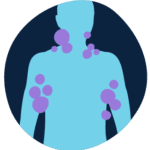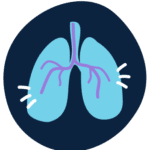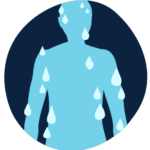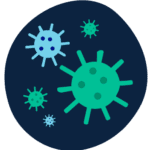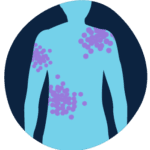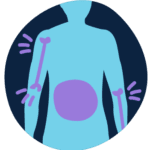Blood cancer signs and symptoms
Blood cancer symptoms vary depending on the type of blood cancer, such as leukaemia, lymphoma, myeloma, MDS, MPN or other blood cancers and disorders.
Some common blood cancer symptoms explained. Please note, some symptoms can look different on different skin tones.
Unexplained weight loss
Cause: Cancer cells and the body’s reaction to them can alter your body’s metabolism and reduce muscle and fat.
What you might expect: Weight loss that seems unusual based on your current diet and exercise.
Unexplained bruising or bleeding
Cause: Low level of platelets, which help the blood to clot.
What you might expect:
- You may have bleeding from your nose or gums, prolonged bleeding from a cut, heavy periods, or blood in your urine or poo.
- In very rare cases, there may be a bleed into the brain, which can cause neurological symptoms.
- Petechiae – tiny, unraised red blood spots under the skin, often starting on legs.
- On darker skin, they show up as darker than the skin around them.
Lumps or swellings
Cause: Abnormal white blood cells building up in your lymph glands
What you might expect:
- Most likely to notice these in your neck, armpit or groin.>
- Usually painless, although some people find they ache.>
- If there are lumps or swellings further inside your body, and they press on organs such as your lungs, this may cause pain, discomfort or breathlessness.>
Shortness of breath
Cause: Anaemia (a low level of red blood cells).
What you might expect:
- Breathlessness even when you’re resting.
- Feeling faint or lightheaded.
- Rapid or irregular heartbeat.
Drenching night sweats
Cause: Unknown
What you might expect:Some people with lymphoma or leukaemia have drenching night sweats but we don’t know what causes this.
Repeat or severe infections
Cause: Low level of white blood cells, which fight infection.
What you might expect:
- Infections that are persistent, recurrent or severe.
- Flu-like symptoms such as chills or shivering, coughing or a sore throat.
- Mouth ulcers that don’t go away.
Regular and frequent fevers
Cause: Low level of white blood cells, which fight infection.
What you might expect: Fever of 38°C or above even if there aren’t any other obvious signs of infection.
Unexplained rash or itchy skin
Cause: Rashes can be caused by a low level of platelets.Some people with blood cancer experience itching, but we don’t fully understand what causes this yet.
What you might expect:
- You may notice small red spots in the skin (petechiae) or a purple rash (purpura).
- Petechiae and purpura don’t fade when you press on them.
- Itching due to lymphoma can be severe. It may also cause a burning sensation.
- On darker skin, these will appear darker than the surrounding skin.
Pain in your bone, joints or abdomen
Cause: Damage to your bones (bones and joints) and abnormal blood cells building up in your spleen (abdominal pain).
What you might expect:
- Myeloma can cause pain in any major bones such as your back, ribs or hips.
- You may feel full after only eating small amounts, have discomfort under your ribs on the left side, have bloating or swelling, or occasionally pain.
Fatigue
Cause: Anaemia (a low level of red blood cells)
What you might expect:
- Tiredness that doesn’t go away with rest or sleep.
- Feeling faint and headaches.
Unusually pale complexion
Cause: Anaemia (a low level of red blood cells).
What you might expect:
- Unusually pale complexion (pallor).
- Feeling faint and headaches.
- People with darker skin may look greyish with pale palms on their hands.
Acute Blood Cancer Multiple Symptoms
Cause: Very high level of white blood cells. Some types of blood cancer such as acute myeloid leukaemia (AML) develop very quickly and may make you suddenly very unwell. This is known as leukostasis.
What you might expect: Breathing problems and neurological symptoms such as visual changes, confusion, vomiting, loss of muscle control or seizures.
Anyone with these symptoms needs medical attention immediately.
Not everyone will have the same symptoms, and people may have symptoms that are not listed here. Symptoms usually present as a cluster, if you are concerned, always contact your doctor.
When you visit your doctor
Here are some helpful tips that you might like to consider when visiting your doctor:
- Prepare for your appointment by writing questions and concerns down beforehand
- Be open and honest about all the signs, symptoms and health concerns you have
- Don’t be afraid to ask questions – you can ask about anything you don’t understand
- Bring a family member or friend, if you would like them to be there
- Take notes of the discussion, actions and decisions
- Bring any medications you are taking
Questions to ask your doctor
- I’m worried about blood cancer – is that something you can rule out?
- Do I need a blood test?
- Do I need a lymph node biopsy?
- Do I need any scans?
- Do you need to take a urine sample?
We have more specific information about symptoms for different types of blood cancer plus information about each disease, diagnosis, treatment and side-effects.
Need to talk? A Blood Cancer Support Coordinator is here for you. Call 1800 620 420 or email [email protected]
We’d like to acknowledge Blood Cancer UK for the wonderful work they’ve done on developing this comprehensive resource on blood cancer related symptoms.
Last updated on May 24th, 2024
Developed by the Leukaemia Foundation in consultation with people living with a blood cancer, Leukaemia Foundation support staff, haematology nursing staff and/or Australian clinical haematologists. This content is provided for information purposes only and we urge you to always seek advice from a registered health care professional for diagnosis, treatment and answers to your medical questions, including the suitability of a particular therapy, service, product or treatment in your circumstances. The Leukaemia Foundation shall not bear any liability for any person relying on the materials contained on this website.

